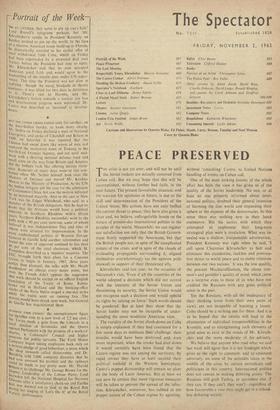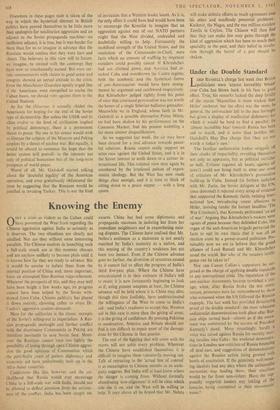PEACE PRESERVED
'THE crisis is not yet over, and will not be until 1 the Soviet rockets are actually removed from Cuban soil. But we may hope that this will be accomplished, without further bad faith, in the near future. The present favourable situation, and the warrant for optimism in future, is due to the skill and determination of the President of the United States, His actions have not only baffled the current threat to peace; they have also given a clear and, we believe, unforgettable lesson on the nature of present-day international politics to the peoples of the world. Meanwhile, we can register our satisfaction not only that the British Govern- ment firmly supported the Americans, -but that the British people too, in spite of the complicated nature of the crisis, and in spite of the clouds of rn:sleading propaganda surrounding it, aligned themselves overwhelmingly (as the opinion polls showed) in support of their threatened ally.
Khrushchev said last year, on the occasion of Nkrumah's visit, 'Even if all the countries of the world adopted a decision which did not accord with the interests of the Soviet Union and threatening its security, the Soviet Union would not recognise such a decision and would uphold its rights by relying on force.' Such words should be pondered. But at least they show that the Soviet leader may not be incapable of under- standing the more moderate American view.
The rapidity of the Soviet climb-down on Cuba is simply explained. if they had continued for a few more days to maintain their challenge, their 'missiles would have been destroyed and, even more important, when the smoke had died down it would certainly have been found that the Castro regime was not among the survivors. By rapid retreat they have at least secured their political toehold in the Western hemisphere. Castro's puppet dictatorship will remain an ulcer on the body of Latin America. But at least we can now be certain that more vigorous measures will be taken to prevent the spread of the infec- tion. Khrushchev, moreover, has rubbed in the puppet nature of the Cuban regime by agreeing,
without 'consulting' Castro, to United Nations handling of events on Cuban soil.
One of the most striking lessons of the whole affair has been the view it has given us of the *quality of the Soviet leadership. No one, or at least no one properly informed about inter- national politics, doubted their general intention of harming the free world and expanding their sphere at the expense of the democracies. In this sense there was nothing new in their latest manoeuvre. But the tactics with which they attempted to implement their long-term strategical plan were a revelation. What was re- vealed was a shallow, irresponsible adventurism. President Kennedy was right when he said, 'I call upon Chairman Khrushchev to halt and eliminate this clandestine, reckless and provoca- tive threat to world peace and to stable relations between our two nations.' It was the low quality, the peasant Machiavellianism, the cheap con- man's and gambler's quality of mind, which came as a surprise even to those of us who have not credited the Russians with any great political sense in the past.
Yet the Russians, with all the inadequacy of their thinking (even frcim their own point of view), are not incapable of learning a lesson. Cuba should be a striking one for them. And it is to be hoped that the results will lead to the elimination of individual irresponsibilities in the Kremlin, and to strengthening such elements of good sense as exist in the minds of Mr. Khrush- chev and the more moderate of his advisers.
We believe that anyone who read what we said last week will agree that it is not hindsight which gives us the right to comment, and to. comment adversely, on some of the attitudes taken in the middle of the crisis by certain periodicals and politicians in this country. International politics does not consist in making debating points. The Russians will grab Turkey, or anywhere else, if they can. If they can't, they won't—regardless of how favourable a vote they might get in a school- boy debating society.



































 Previous page
Previous page